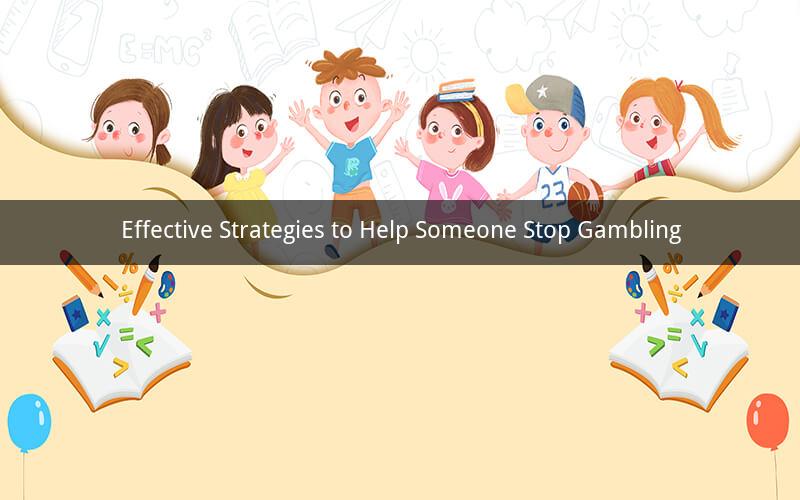
Introduction:
Gambling addiction is a serious issue that affects millions of individuals worldwide. It can lead to significant financial, emotional, and social problems. If you know someone who is struggling with gambling addiction, it is crucial to understand how to help them stop. This article provides practical strategies to support someone in overcoming their gambling addiction.
1. Encourage Open Communication:
The first step in helping someone stop gambling is to have an open and honest conversation with them. Listen to their concerns and fears without judgment. It is important to create a supportive environment where they feel comfortable sharing their struggles. Encourage them to express their emotions and thoughts about gambling.
2. Understand the Underlying Causes:
To effectively address gambling addiction, it is essential to understand the underlying causes. Some common factors include escapism, boredom, financial stress, or even a genetic predisposition. By understanding the root causes, you can help your loved one develop coping mechanisms to address these issues.
3. Seek Professional Help:
Encourage your loved one to seek professional help from a therapist or counselor specializing in gambling addiction. They can provide personalized support and treatment tailored to their specific needs. Therapy may involve cognitive-behavioral therapy (CBT) or other evidence-based techniques to help them overcome their addiction.
4. Set Clear Boundaries:
Setting clear boundaries is crucial in supporting someone struggling with gambling addiction. This may involve limiting their access to gambling resources, such as blocking gambling websites or removing credit cards. It is essential to communicate these boundaries clearly and consistently.
5. Develop a Support System:
Creating a support system is vital in helping someone stop gambling. Encourage your loved one to connect with others who have overcome gambling addiction, such as support groups or online communities. These individuals can provide encouragement, share their experiences, and offer practical advice.
6. Provide Financial Support:
Gambling addiction often leads to significant financial difficulties. Offering financial support can help your loved one stabilize their financial situation and reduce the temptation to gamble. However, it is crucial to ensure that the support does not enable their addiction or discourage them from seeking professional help.
7. Encourage Alternative Activities:
Encourage your loved one to engage in alternative activities that can provide similar thrills or excitement as gambling. This may include hobbies, sports, or joining clubs or groups with similar interests. Finding healthy alternatives can help them replace gambling as a means of entertainment.
8. Be Patient and Understanding:
Recovery from gambling addiction is a gradual process that requires patience and understanding. There may be setbacks and challenges along the way. Be supportive and remind your loved one that recovery is possible. Celebrate their successes, no matter how small, to help them stay motivated.
9. Monitor Progress and Adjust Strategies:
Regularly monitor your loved one's progress and be prepared to adjust your support strategies as needed. Recovery is a unique journey for each individual, and it is essential to be flexible and adapt to their changing needs.
10. Stay Informed and Educated:
Stay informed about gambling addiction and its treatment options. This knowledge can help you provide more effective support and guidance to your loved one. Attend workshops, read reputable sources, and consult with professionals to ensure you are well-equipped to help them on their journey to recovery.
Questions and Answers:
1. What are some common signs of gambling addiction?
Gambling addiction often manifests through financial problems, secretive behavior, increased time spent gambling, neglecting responsibilities, and experiencing negative consequences due to gambling.
2. Can therapy alone help someone overcome gambling addiction?
While therapy can be a crucial component of recovery, it is often most effective when combined with other strategies, such as support groups, financial support, and lifestyle changes.
3. How can I encourage someone to seek professional help for their gambling addiction?
You can encourage them by expressing your concern, offering to help them find a therapist or counselor, and reassuring them that seeking help is a sign of strength, not weakness.
4. What role does financial support play in helping someone stop gambling?
Financial support can help stabilize someone's financial situation and reduce the temptation to gamble. However, it is important to ensure that the support does not enable their addiction or discourage them from seeking professional help.
5. Can a person recover from gambling addiction on their own?
While recovery is possible, seeking support from professionals, support groups, and loved ones can significantly improve the chances of successful recovery. Support and guidance from others can provide the necessary tools and motivation to overcome addiction.